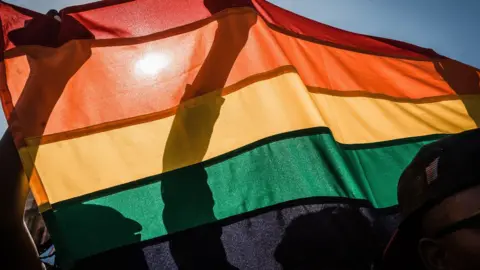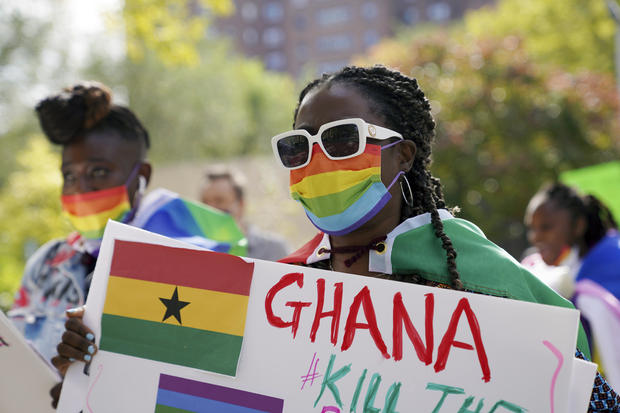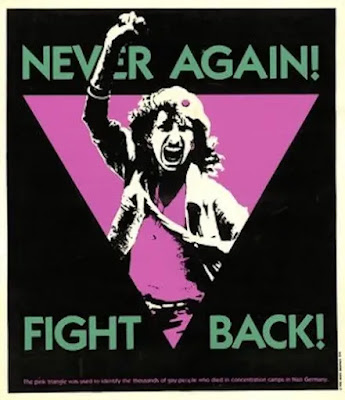HUMAN RIGHTS ILLEGAL IN GHANA
Ghana passes bill making identifying as LGBTQ+ illegalUganda, the nation with the most extreme anti-LGBTQ laws in Africa, is currently considering a ruling on a law there that threatens life imprisonment and even death for homosexuality.
Ghana’s parliament has passed the highly contentious Anti-LGBTQ+ bill after about three years of deliberations.
The new bill imposes a prison sentence of up to three years for anyone convicted of identifying as LGBTQ+.
It also imposes a maximum five-year jail term for forming or funding LGBTQ+ groups.
The bill was approved unanimously on Wednesday following the completion of the third reading. Proposed amendments to the bill were rejected by the Speaker, Alban Bagbin, during the session.
Lawmakers heckled down attempts to replace prison sentences with community service and counselling.
It is the latest sign of growing opposition to LGBTQ+ rights in the conservative West African nation.
The bill is now slated to be forwarded to President Akufo-Addo for his assent for it to be signed into law.
The president has in the past said that he would do so if the majority of Ghanaians want him to.
Last month Amnesty International warned that the bill "poses significant threats to the fundamental rights and freedoms" of LGBTQ+ people.
Activists fear there will now be witch-hunts against members of the LGBTQ+ community and those who campaign for their rights, and say some will have to go into hiding.
The bill proposes a jail term of up to 10 years for anyone involved in LGBTQ+ advocacy campaigns aimed at children.
It also encourages the public to report members of the LGBTQ+ community to authorities for "necessary action".
Ghana passes bill making identifying as LGBTQ+ illegal
By Thomas Naadi
By Thomas Naadi
BBC News, Accra


AFP
Ghana's parliament has passed a tough new bill that imposes a prison sentence of up to three years for anyone convicted of identifying as LGBTQ+.
It also imposes a maximum five-year jail term for forming or funding LGBTQ+ groups.
Lawmakers heckled down attempts to replace prison sentences with community service and counselling.
It is the latest sign of growing opposition to LGBTQ+ rights in the conservative West African nation.
The bill, which had the backing of Ghana's two major political parties, will come into effect only if President Nana Akufo-Addo signs it into law.
He previously said that he would do so if the majority of Ghanaians want him to.
Gay sex is already against the law in Ghana - it carries a three-year prison sentence.
Last month Amnesty International warned that the bill "poses significant threats to the fundamental rights and freedoms" of LGBTQ+ people.
Activists fear there will now be witch-hunts against members of the LGBTQ+ community and those who campaign for their rights, and say some will have to go into hiding.
The bill proposes a jail term of up to 10 years for anyone involved in LGBTQ+ advocacy campaigns aimed at children
It also encourages the public to report members of the LGBTQ+ community to authorities for "necessary action".
MPs said the bill was drafted in response to the opening of Ghana's first LGBTQ+ community centre in the capital, Accra, in January 2021.
Police shut the centre following public protests, and pressure from religious bodies and traditional leaders in the largely Christian nation.
At the time, the Christian Council of Ghana and the Ghana Pentecostal and Charismatic Council said in a joint statement that being LGBTQ+ was "alien to the Ghanaian culture and family value system and, as such, the citizens of this nation cannot accept it".
The bill approved by lawmakers is a watered-down version of an earlier draft - for instance, jail terms have been shortened and a controversial clause on conversion therapy has been removed.
During the days-long debate, the deputy parliamentary leader of the governing party, Alexander Afenyo-Markin, suggested further changes.
He said lawmakers should decide, via a secret ballot, whether people convicted of being members of the LGBTQ+ community should be imprisoned by the courts or ordered to do community service and undergo counselling.
However, he was heckled into submission by lawmakers who supported prison sentences.
Ghana's parliament has passed a tough new bill that imposes a prison sentence of up to three years for anyone convicted of identifying as LGBTQ+.
It also imposes a maximum five-year jail term for forming or funding LGBTQ+ groups.
Lawmakers heckled down attempts to replace prison sentences with community service and counselling.
It is the latest sign of growing opposition to LGBTQ+ rights in the conservative West African nation.
The bill, which had the backing of Ghana's two major political parties, will come into effect only if President Nana Akufo-Addo signs it into law.
He previously said that he would do so if the majority of Ghanaians want him to.
Gay sex is already against the law in Ghana - it carries a three-year prison sentence.
Last month Amnesty International warned that the bill "poses significant threats to the fundamental rights and freedoms" of LGBTQ+ people.
Activists fear there will now be witch-hunts against members of the LGBTQ+ community and those who campaign for their rights, and say some will have to go into hiding.
The bill proposes a jail term of up to 10 years for anyone involved in LGBTQ+ advocacy campaigns aimed at children
It also encourages the public to report members of the LGBTQ+ community to authorities for "necessary action".
MPs said the bill was drafted in response to the opening of Ghana's first LGBTQ+ community centre in the capital, Accra, in January 2021.
Police shut the centre following public protests, and pressure from religious bodies and traditional leaders in the largely Christian nation.
At the time, the Christian Council of Ghana and the Ghana Pentecostal and Charismatic Council said in a joint statement that being LGBTQ+ was "alien to the Ghanaian culture and family value system and, as such, the citizens of this nation cannot accept it".
The bill approved by lawmakers is a watered-down version of an earlier draft - for instance, jail terms have been shortened and a controversial clause on conversion therapy has been removed.
During the days-long debate, the deputy parliamentary leader of the governing party, Alexander Afenyo-Markin, suggested further changes.
He said lawmakers should decide, via a secret ballot, whether people convicted of being members of the LGBTQ+ community should be imprisoned by the courts or ordered to do community service and undergo counselling.
However, he was heckled into submission by lawmakers who supported prison sentences.
Ghana's parliament passes strict new anti-LGBTQ legislation to extend sentences and expand scope
By Sarah Carter
February 28, 2024 / CBS News
Johannesburg — Ghana's parliament approved a highly controversial anti-LGBTQ bill on Wednesday after months of debate. The Human Sexual Rights and Family Values bill is one of the toughest pieces of anti-LGBTQ legislation in Africa.
Homosexuality is already illegal in Ghana and punishable by up to three years in prison. Under the new law, that maximum sentence will increase to five years. It would also bring in a custodial sentence for people convicted of advocating for LGBTQ rights and make the distribution of material deemed supportive of LGBTQ rights illegal.

People attend a rally against a controversial bill being considered by Ghana's parliament that would make identifying as LGBTQ or advocating for LGBTQ rights a criminal offense punishable by prison, in the Harlem neighborhood of New York
EMILY LESHNER/AP
The bill, which was sponsored by a group of traditional leaders from Ghana's Christian and Muslim communities, now must be signed into law by President Nana Akufo-Addo. He's widely expected to do so, though he's not said publicly whether he'll sign the legislation.More than 60 "gay suspects" detained at same-sex wedding in Nigeria
The Big 18 & Human Rights Coalition, an umbrella group of lawyers and activists in Ghana, said at a Tuesday news conference that the bill "criminalizes a person's identity and strips away fundamental human rights" and urged the president to reject it.
Takyiwaa Manuh, a senior fellow at the Ghana Centre for Democratic Development, noted to CBS News that Akufo-Addo has not signed any previous privately sponsored bills into law due to the demands of an article in the country's constitution that requires scrutiny over potential financial impacts of legislation.
Manuh said the speaker of the parliament had carried out no such analysis of the new bill as required, and that if it is enacted, she argued that it would place a "heavy burden on the judiciary, the police and other aspects of life."
"I am sad, disappointed and surprised that our commitment and democratic principles in this country appear to be so shallow," lamented Manuh. "This bill represents a real danger to our country, and we are looking to the president to uphold the values of our country and constitution."
Manuh said Ghanaian civil society organizations were ready to file legal challenges against the bill.
"Shockingly, we have found that the majority of people haven't even read the bill," which she said, "implies duties on parents, landlords, owners of businesses."
She said when people do read and understand how they could actually be implicated by the legislation, they're shocked at how it could make them liable for the actions of others.
As the debate over the bill increased in recent weeks, so did attacks on members of the LGBTQ community. Activists say students have been attacked and expelled from school, people have been robbed, and many have been subjected to extortion from community members threatening to out them.
Manuh said her organizatioon had received numerous reports of people being banished from their hometowns, losing their jobs and all support from their own families.
"It's a chilling feeling," she told CBS News. "No one should face jail time or harassment for their sexuality. Their rights must be respected."
The United Nations warned in 2021 that the proposed law would "create a system of state-sponsored discrimination and violence" against gay people in Ghana.
The top constitutional court in Uganda, the nation with the most extreme anti-LGBTQ laws in Africa, is currently considering a ruling on a law there that threatens life imprisonment and even death for homosexuality.
Ugandan civil rights groups immediately challenged the anti-homosexuality act when it passed in December. The U.S. has condemned that legislation and sanctioned Uganda by restricting visas and withholding trade over it.
It is not clear how long the court may take to issue its ruling on the constitutionality of the law.
The bill, which was sponsored by a group of traditional leaders from Ghana's Christian and Muslim communities, now must be signed into law by President Nana Akufo-Addo. He's widely expected to do so, though he's not said publicly whether he'll sign the legislation.More than 60 "gay suspects" detained at same-sex wedding in Nigeria
The Big 18 & Human Rights Coalition, an umbrella group of lawyers and activists in Ghana, said at a Tuesday news conference that the bill "criminalizes a person's identity and strips away fundamental human rights" and urged the president to reject it.
Takyiwaa Manuh, a senior fellow at the Ghana Centre for Democratic Development, noted to CBS News that Akufo-Addo has not signed any previous privately sponsored bills into law due to the demands of an article in the country's constitution that requires scrutiny over potential financial impacts of legislation.
Manuh said the speaker of the parliament had carried out no such analysis of the new bill as required, and that if it is enacted, she argued that it would place a "heavy burden on the judiciary, the police and other aspects of life."
"I am sad, disappointed and surprised that our commitment and democratic principles in this country appear to be so shallow," lamented Manuh. "This bill represents a real danger to our country, and we are looking to the president to uphold the values of our country and constitution."
Manuh said Ghanaian civil society organizations were ready to file legal challenges against the bill.
"Shockingly, we have found that the majority of people haven't even read the bill," which she said, "implies duties on parents, landlords, owners of businesses."
She said when people do read and understand how they could actually be implicated by the legislation, they're shocked at how it could make them liable for the actions of others.
As the debate over the bill increased in recent weeks, so did attacks on members of the LGBTQ community. Activists say students have been attacked and expelled from school, people have been robbed, and many have been subjected to extortion from community members threatening to out them.
Manuh said her organizatioon had received numerous reports of people being banished from their hometowns, losing their jobs and all support from their own families.
"It's a chilling feeling," she told CBS News. "No one should face jail time or harassment for their sexuality. Their rights must be respected."
The United Nations warned in 2021 that the proposed law would "create a system of state-sponsored discrimination and violence" against gay people in Ghana.
The top constitutional court in Uganda, the nation with the most extreme anti-LGBTQ laws in Africa, is currently considering a ruling on a law there that threatens life imprisonment and even death for homosexuality.
Ugandan civil rights groups immediately challenged the anti-homosexuality act when it passed in December. The U.S. has condemned that legislation and sanctioned Uganda by restricting visas and withholding trade over it.
It is not clear how long the court may take to issue its ruling on the constitutionality of the law.


No comments:
Post a Comment